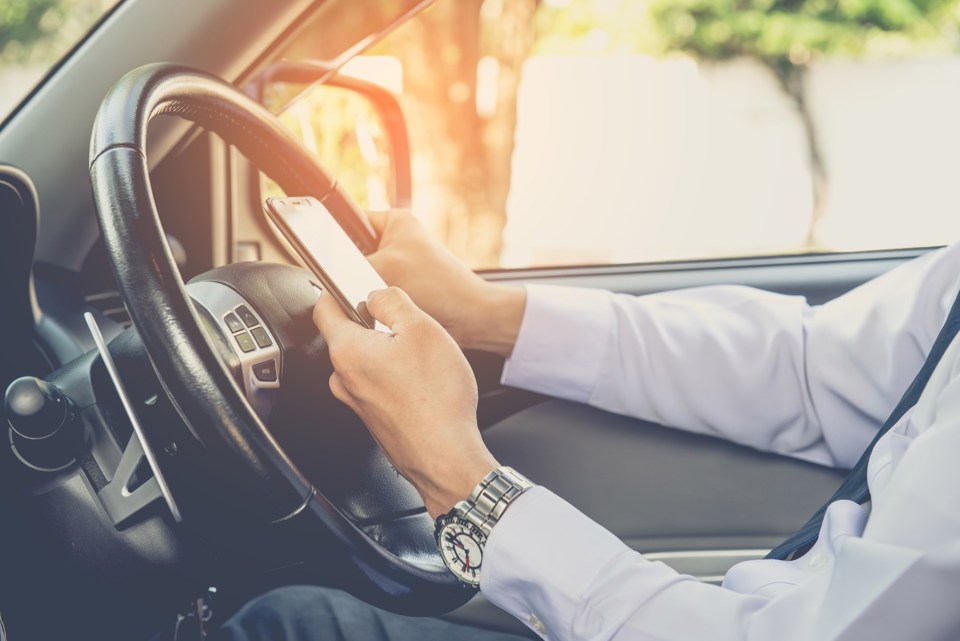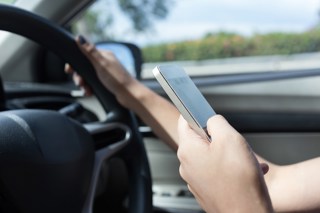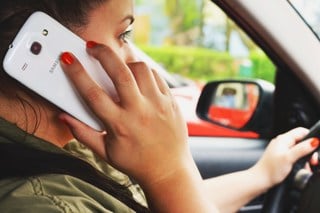A third of motorists (31%) believe current penalties for using a mobile phone while driving are still not enough of a deterrent, according to new research from the RAC.
Respondents to the survey of 2,000 UK drivers said they believe more visible enforcement of the law was the key to getting people to change their behaviour (41%) rather than introducing even stronger penalties (22%).
More than a year on from the introduction of tougher penalties for using a handheld phone at the wheel, the research suggested that nearly two-thirds of drivers (64%) remain unaware what the consequences of breaking the 15-year-old law are.
Just 36% of motorists surveyed could correctly state that the current penalties are six points and a £200 fine for using a handheld mobile phone while driving. A quarter (26%) were not aware the penalties became more severe in March 2017.
One in five (18%) respondents told the RAC that they would advocate the blocking of mobile phone signals within cars altogether, while one in 10 (10%) think more public awareness campaigns, such as those run by the Government’s Think initiative, are what would make persistent drivers finally kick the habit.
RAC road safety spokesman Pete Williams said: “Our research clearly shows motorists believe the key to ending other drivers’ dangerous handheld phone use is greater enforcement and that tougher penalties are really only part of the answer. This makes sense – despite the increased penalties there remains a hard core of drivers who continue to ignore the law and all the risks associated with handheld phone use.”
The RAC research comes as Government figures suggest a 30% drop in motorists being charged with using their mobile phone while at the wheel.
The latest statistics for England and Wales, from the Ministry of Justice (MoJ), show the number of offences dropped from 13,000 in 2016 to 9,000 in 2017.
The RAC research also looked at the reasons drivers gave for either continuing to use a handheld phone while driving, or for finally deciding to ‘hang up’ their handheld phone for good.
Of those who persist in using a handheld phone an overwhelming majority (87%) said it is something they do when they are on their own and not when others are in the car with them.
There could be a variety of reasons for this: from these drivers not wanting friends and family to know they do it, through to the phone being company on their journey, or even to alleviate boredom.
Meanwhile, 78% said they continue to do it despite fearing they will get caught by a police officer, while nearly a quarter (23%) think they can safely drive and use a handheld phone at the same time.
One in 10 (11%) say they believe the road safety risks of combining driving with something as distracting as using a handheld phone are ‘overstated’.
Reassuringly, 31% of all drivers surveyed said they have made the decision to stop using a handheld phone at the wheel, with a small proportion (12%) having done so after the announcement of the tougher penalties in September 2016.
Drivers gave a range of reasons for deciding to kick the handheld phone habit – nearly half (44%) said it was the impact of road safety campaigns from the likes of Think and Be Phone Smart, more than a third (36%) said it was the fear of getting caught and a similar proportion (34%) said it was the risk of causing an accident.
Latest figures show that the number of fatal collisions caused by motorists using a mobile phone while driving are rising. There were 32 fatal collisions in 2016, up from 22 the year before, and a total of 2,210 collisions of all severities where a mobile phone was involved between 2012 and 2016.
Previous RAC research also suggests that around nine million UK motorists habitually use a handheld phone while driving.
Williams said: “Picking up and using a handheld phone while driving is a personal choice that motorists make, albeit a dangerous and illegal one.
“While it is reassuring that a good number of motorists have decided to make a positive choice and stop doing it, there is still much more to be done to make everyone else change their behaviour.”
Chief Constable Anthony Bangham, National Police Chiefs’ Council lead for Roads Policing, added: “The law surrounding mobile phone use behind the wheel has been widely publicised, and the increase in penalties last year is representative of how prevalent this dangerous practice is.
“However, notwithstanding the legal repercussions, the main thing we want drivers to do is arrive safely at their destinations.
“When you are driving, the priority should be the safety of yourself, your passengers, and your fellow road users. Whatever is happening on your mobile phone can always wait.”






















Login to comment
Comments
No comments have been made yet.